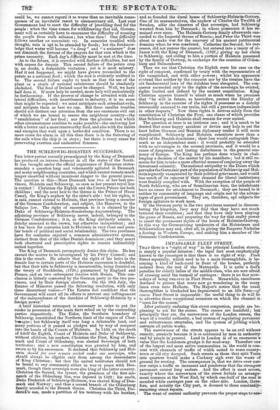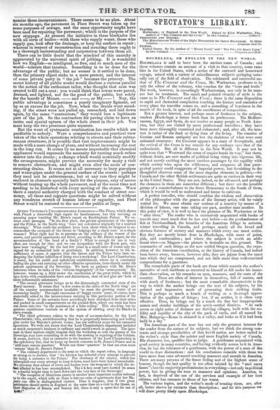IMPASSABLE FLEET STREET.
THAT there is a "right of way " in the principal London streets, is simply a popular delusion : the legal fact most emphatically known to the passenger is that there is no right of way. Fleet Street especially, which used to be a main thoroughfare, is be- coming a kind of back-yard in front of the houses, perfectly isolated from the rest of the Metropolis. It is quite a fool's - paradise for elderly ladies of the middle class who are sore afraid -
of crossing amid the turmoil of carriages : class, is no fear now- a-days of being run over in Fleet Street. Meanwhile, omnibuses destined to pursue that route now go wandering in the mazy lanes even unto Holborn. The Mayor's notice that the usual thoroughfare is blockaded has degenerated to an idle form—of course Fleet Street is impassable : the useful thing to do will be to advertise those exceptional occasions on which the channel is "open for the season."
After patiently enduring this street congestion, people are be- ginning to ask for the causes. The causes are manifold ; but principally they are the narrowness of the London streets, the want of a central authority, a bad system of regulating pavement and subterranean structures, and the system of jobbing which corrupts all public works. The narrowness of the streets appears to be an evil without remedy, precisely because it is so accounted by men in authority and by people in general. Land in London is of so enormous a: value that the Londoners grudge it for road-way. Therefore one • of the largest and most active communities in the world is con- tent with channels of traffic of width suited to some county-, town or old city decayed. Such streets as those that split Turin into quarters would make a Cockney sigh over the waste of ground for renting. The consequence is, that we drive over nar- row strips a traffic so incessant and ponderous that the strongest' pavement cannot long endure. And the effect is most severe,. exactly where the narrowness of the street forbids an arrange- ment common at the West End, by which one-half of the road iL -mended while carriages pass on the other side. London, there- fore, and notably the City part, is doomed to these constantly- recurring street repairs.
The want of central authority prevents the proper-stepe to eco- nomize those inconveniences. There seems to be no plan. About SIX months ago, the pavement in Fleet Street was taken up for some purposes of sewage, and the same opportunity might have been used for repairing the pavement; which is the purpose of the new stoppage. At present the initiative in these blockades lies with all sorts of bodies—with those who supply water, those who supply gas, look after the drainage, or keep the surface in repair ; whereas in respect of reconstruction and mending there ought to be a thorough understanding and cooperation between them all.
There can be little doubt that the mischief of this anarchy is aggravated by the universal spirit of jobbing. It is wonderful how we English—so intelligent, so free, and so much men of the world—tolerate that incubus. Something is to be done for the advantage of the public; but no sooner is it settled to be done, than the primary object sinks to a mere pretext, and the interest of some private party in "the job" becomes the primary. The secret history of all public works would disclose a curious parallel to the notion of the enthusiast tailor, who thought that man was created to fill out a coat: you would think that towns were paved, drained, and lighted, not for the good of the public, but solely for the benefit of Messrs. — and —, or Mr.— ! Nay, the public advantage is sometimes a purely imaginary figment, set up as an excuse for the job. Now, when the drains want mend- ing, if the street were not pulled up, ransacked, and laid down again, by the same "contractors," they would lose a legitimate part of the job. So the contractors for pavin&- claim to have an entire and special upturn of the whole street in their job. You must keep the two processes quite separate. But the want of systematic combination has results which are profitable to nobody. Were a comprehensive and practical view taken of the whole operations relating to streets and their subter- ranean structures, it is possible that vast improvements might be made with a mere change of plans, and without increasing the cost in the long run. It seems by no means improbable that chemical appliances would supersede the necessity for turning much refuse matter into the drains ; a change which would materially modify the arrangements, might prevent the necessity for many a visit to remove obstructions, and might even alter the mode of con- structing drains. It seems not at all necessary to bury gas-pipes and water-pipes under the general surface of the streets : perhaps they need not be subterranean ; but at any rate they might be enclosed in channels specially built for the purpose, easy of access 'without tearing up the whole pavement, and at the same time not needing to be disturbed with every moving of the stones. Were there a central authority charged with the conduct of street eco- nomy, all these and cognate questions might be solved without any wondrous stretch of human labour or sagacity, and Fleet Street would be restored to the use of the public at large.



























 Previous page
Previous page